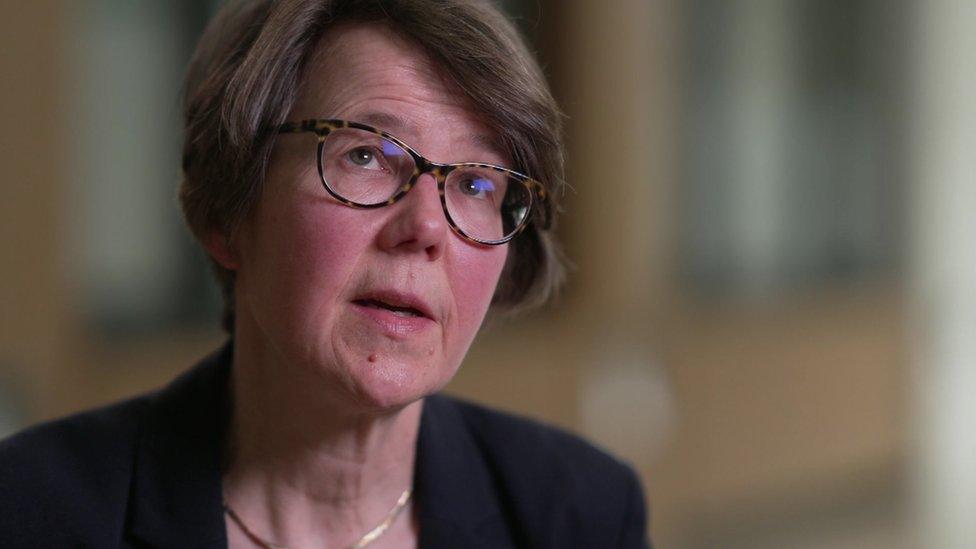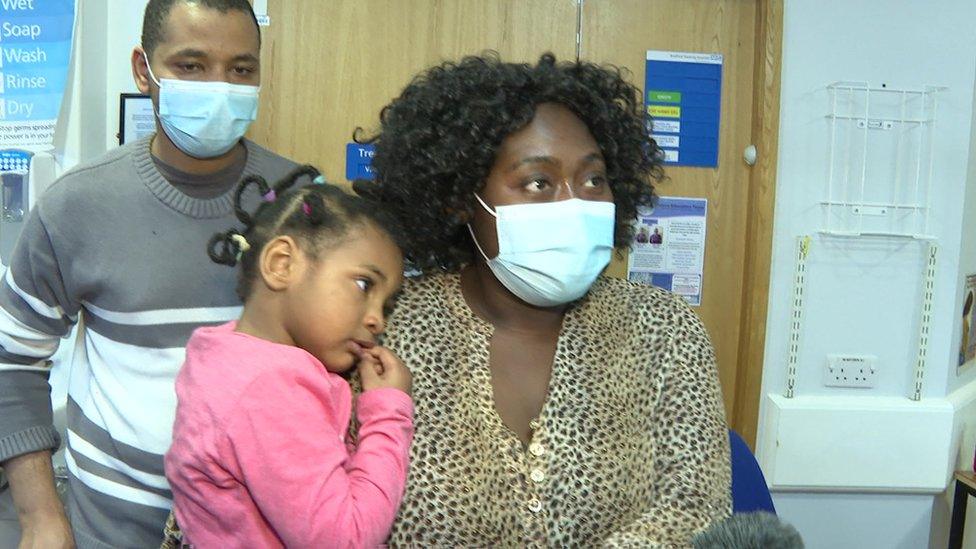Pregnant women 'afterthought' in Covid jab rollout
- Published

Professor Marian Knight said her job had made her cry
Pregnant women have been an "afterthought" during the coronavirus pandemic and some of their deaths were "preventable", a leading scientist has told Newsnight.
Data shows there have been at least 40 maternal deaths from Covid in the UK.
Almost all were unvaccinated and more than half happened after pregnant women were advised to take-up the vaccine.
The regulator says vaccines during pregnancy are "safe".
Professor Marian Knight, who investigates every maternal death in the UK, said lifesaving messaging is still "struggling" to reach pregnant women, a year on since all of them were advised to get vaccinated.
During the pandemic, there have been at least 40 deaths from Covid among women who were either pregnant or who had just given birth in the UK, according to data shared with Newsnight.
Of those, 38 were unvaccinated and more than half of the deaths happened during the Delta and Omicron waves last year.
Professor Knight said: "This has perhaps been the first year where my job has made me cry because that was a preventable situation."
Latest data from the UK Health Security Agency shows out of the 528,362 women to give birth during 2021, 102,089 had received at least one dose of a Covid vaccine - just one in five.
Out of an estimated 1.1 million women who gave birth in the UK between March 2020 and October 2021, 4,436 (0.4%) were admitted to hospital with a Covid infection, a recent study, external found.
Covid in pregnancy linked to birth-related complications
Covid: Stillbirth and prematurity risks may be higher in pregnancy
Can the Covid vaccine harm unborn babies during pregnancy?, external
'Best for your baby'
Jessica has always been anxious about the thought of getting a Covid vaccine while pregnant.
Three months into her first pregnancy, the 28-year-old was told it was time for her booster. She panicked.
"I have always wanted a family and I was really scared that I was going to make a decision based on something I didn't really know anything about and it would affect our ability to have a family," she explains. "It really did scare me."
Despite being surrounded by health officials in her admin role for the NHS, the 28-year-old couldn't understand why there had been the "sudden shift" in official advice during the first months of the vaccine rollout.
Speculation and misinformation on social media compounded her anxiety further.
Ellen, who is expecting her second child, agreed: "I was worried at the beginning, but after I had Covid in January, I would rather get the protection.
"Being pregnant during the pandemic is hard. You're in constant fear because you're not just caring for yourself."
Both women, who are from Bradford, decided to get their third dose after a lot of research and speaking to health professionals.

Ellen said being pregnant in the pandemic was hard
They were able to do it during their routine appointments because their local maternity ward was running pop-up vaccine clinics.
Vaccination Lead for Bradford District and Craven Clinical Commissioning Group, Rukeya Miah, said: "Women want a bit more reassurance about what the side effects were and what the latest data is saying.
"I think it is natural for a pregnant woman to say: 'Is it safe for me? Is it safe for my baby?' And we've got the data to be able to say 'yes it is'."
The UK's regulator the MHRA said there was no evidence the vaccine increases the risks of miscarriage, stillbirth or other complications.
Health officials are also keen to stress the benefits, such as babies are likely to be born with protective antibodies if their mothers have the vaccine.
At risk groups
During the first months of the vaccine rollout, only pregnant health or care workers or those in at-risk groups were advised by the Joint Committee on Vaccination and Immunisation to "consider" the jab due to a "lack of evidence".
In April 2021, the advice was updated to cover all pregnant women after real-world data raised no safety concerns.
By December 2021, a year after the rollout began, pregnant women were deemed to be more at risk of falling seriously ill from Covid and were put on the priority list for jabs.
Professor Knight, the maternal lead for pregnancy monitoring group MBRRACE-UK, said changing initial advice wasn't helpful, but stresses the JCVI had little choice because pregnant women were not included in Covid vaccine trials.
"It's a complicated message," she said. "The message 'don't get vaccinated because we haven't got any information' is very subtly different from 'don't get vaccinated because it's not safe'. You may think, 'I can't get vaccinated because I'm pregnant, it must not be safe'. Whereas actually we don't yet have enough information."
Professor Knight said pregnant women were an "afterthought" during the pandemic and including them in clinical research must be the "default" in the future "unless there's a good reason not to".
A JCVI spokesperson said the committee's advice for pregnant women has "evolved over the course of the vaccine programme as evidence has accumulated" and would encourage any pregnant women who have not yet taken up the vaccine to come forward to do so.
The MHRA said it was looking at how it could safely increase diversity in clinical research including pregnant women.
A Department of Health and Social Care spokesperson said: "We have always followed the expert advice of the independent Joint Committee on Vaccination and Immunisation.
"We continue to work closely with the NHS, clinicians and partners to provide advice and information at every possible opportunity to support women getting vaccinated."